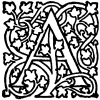Uncle Richard's New Year's Dinner
Prissy Baker was in Oscar Miller's store New Year's morning, buying matches—for New Year's was not kept as a business holiday in Quincy—when her uncle, Richard Baker, came in. He did not look at Prissy, nor did she wish him a happy New Year; she would not have dared. Uncle Richard had not been on speaking terms with her or her father, his only brother, for eight years.
He was a big, ruddy, prosperous-looking man—an uncle to be proud of, Prissy thought wistfully, if only he were like other people's uncles, or, indeed, like what he used to be himself. He was the only uncle Prissy had, and when she had been a little girl they had been great friends; but that was before the quarrel, in which Prissy had had no share, to be sure, although Uncle Richard seemed to include her in his rancour.
Richard Baker, so he informed Mr. Miller, was on his way to Navarre with a load of pork.
"I didn't intend going over until the afternoon," he said, "but Joe Hemming sent word yesterday he wouldn't be buying pork after twelve today. So I have to tote my hogs over at once. I don't care about doing business New Year's morning."
"Should think New Year's would be pretty much the same as any other day to you," said Mr. Miller, for Richard Baker was a bachelor, with only old Mrs. Janeway to keep house for him.
"Well, I always like a good dinner on New Year's," said Richard Baker. "It's about the only way I can celebrate. Mrs. Janeway wanted to spend the day with her son's family over at Oriental, so I was laying out to cook my own dinner. I got everything ready in the pantry last night, 'fore I got word about the pork. I won't get back from Navarre before one o'clock, so I reckon I'll have to put up with a cold bite."
After her Uncle Richard had driven away, Prissy walked thoughtfully home. She had planned to spend a nice, lazy holiday with the new book her father had given her at Christmas and a box of candy. She did not even mean to cook a dinner, for her father had had to go to town that morning to meet a friend and would be gone the whole day. There was nobody else to cook dinner for. Prissy's mother had died when Prissy was a baby. She was her father's housekeeper, and they had jolly times together.
But as she walked home, she could not help thinking about Uncle Richard. He would certainly have cold New Year cheer, enough to chill the whole coming year. She felt sorry for him, picturing him returning from Navarre, cold and hungry, to find a fireless house and an uncooked dinner in the pantry.
Suddenly an idea popped into Prissy's head. Dared she? Oh, she never could! But he would never know—there would be plenty of time—she would!
Prissy hurried home, put her matches away, took a regretful peep at her unopened book, then locked the door and started up the road to Uncle Richard's house half a mile away. She meant to go and cook Uncle Richard's dinner for him, get it all beautifully ready, then slip away before he came home. He would never suspect her of it. Prissy would not have him suspect for the world; she thought he would be more likely to throw a dinner of her cooking out of doors than to eat it.
Eight years before this, when Prissy had been nine years old, Richard and Irving Baker had quarrelled over the division of a piece of property. The fault had been mainly on Richard's side, and that very fact made him all the more unrelenting and stubborn. He had never spoken to his brother since, and he declared he never would. Prissy and her father felt very badly over it, but Uncle Richard did not seem to feel badly at all. To all appearance he had completely forgotten that there were such people in the world as his brother Irving and his niece Prissy.
Prissy had no trouble in breaking into Uncle Richard's house, for the woodshed door was unfastened. She tripped into the hostile kitchen with rosy cheeks and mischief sparkling in her eyes. This was an adventure—this was fun! She would tell her father all about it when he came home at night and what a laugh they would have!
There was still a good fire in the stove, and in the pantry Prissy found the dinner in its raw state—a fine roast of fresh pork, potatoes, cabbage, turnips and the ingredients of a raisin pudding, for Richard Baker was fond of raisin puddings, and could make them as well as Mrs. Janeway could, if that was anything to boast of.
In a short time the kitchen was full of bubbling and hissings and...




















